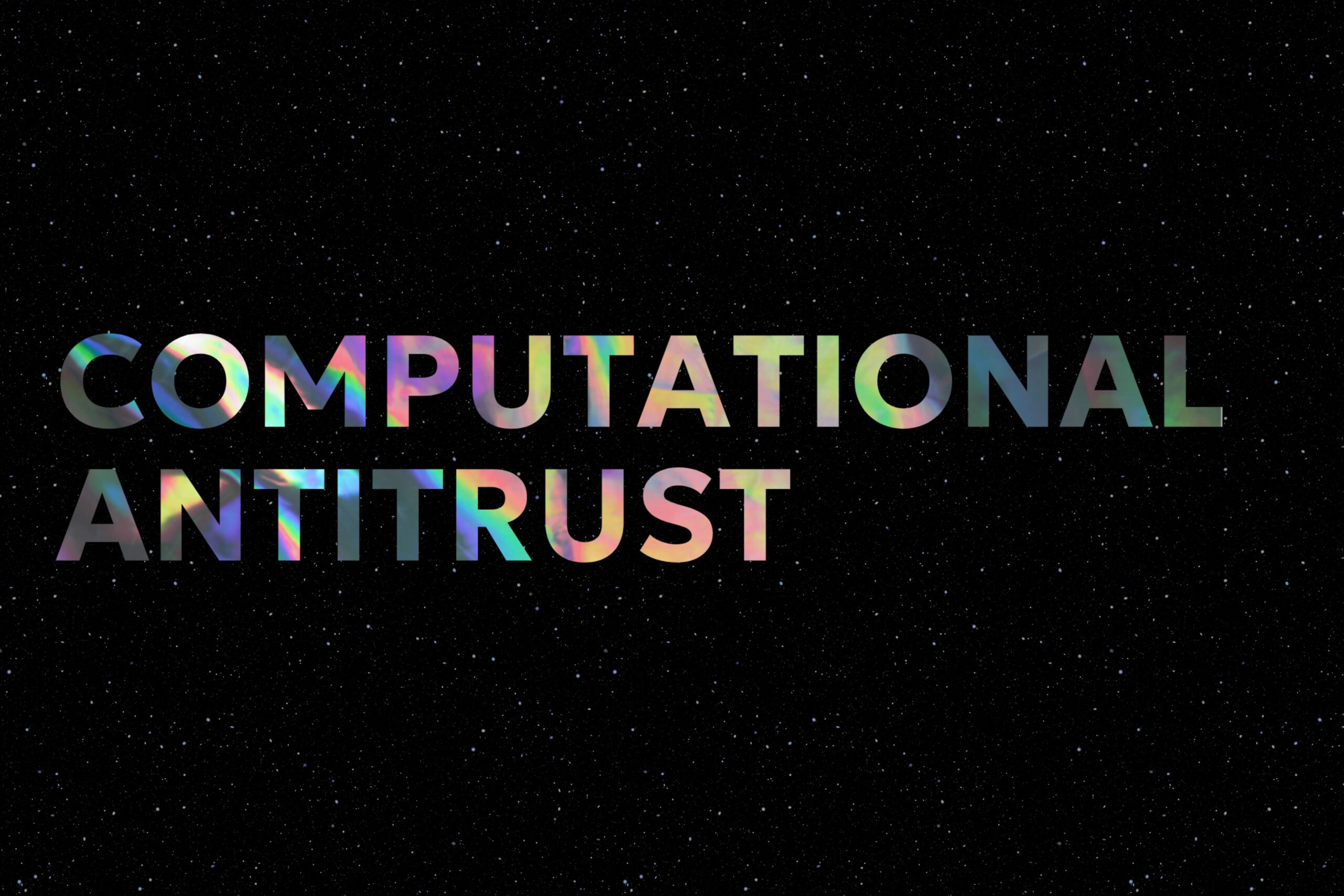As in previous years (see 2015, 2016, 2017, 2018, 2019, and 2020), here are the world’s most downloaded antitrust and competition law articles posted on SSRN during the course of 2021.
************
1. Computational Antitrust: An Introduction and Research Agenda
by Thibault Schrepel
Stanford Computational Antitrust (2.772 downloads)
Computational antitrust is a new domain of legal informatics which seeks to develop computational methods for the automation of antitrust procedures and the improvement of antitrust analysis. The present article first introduces it, then explores how agencies, policymakers, and market participants can benefit from it. Against this background, it sets out a research agenda for the years ahead in view of providing answers to the challenges created by computational antitrust, and better understanding its limits.
*******
2. Harming Competition and Consumers under the Guise of Protecting Privacy: An Analysis of Apple’s iOS 14 Policy Updates
by D. Daniel Sokol & Feng Zhu
Cornell Law Review (1.891 downloads)
Apple’s iOS 14 update represents an anti-competitive strategy disguised as a privacy-protecting measure. Apple now prohibits non-Apple apps from using information essential to providing relevant, personalized advertising, without explicit user opt-in. And users may opt-in only after they are shown an ominous and misleading prompt about “tracking,” one that Apple’s own apps and services need not display, because consumers are automatically “opted in” to Apple’s own tracking. Apple’s policy will have the pernicious effects of enhancing the dominance of iOS among mobile operating systems and the dominance of its own apps and services within the iOS ecosystem, while reducing consumer choice and devastating the free-app ecosystem.
This paper explains: (i) Apple’s dominance in mobile OSs and the competitive dynamics in the industry, including the critical role that personalized advertising plays in today’s mobile app ecosystem; (ii) how Apple’s iOS 14 updates dramatically alter today’s mobile OS ecosystem, wrongfully preference Apple’s own products and services, and help Apple protect and augment its dominance over iOS and more broadly over mobile OSs; and (iii) why such actions harm competition, and by extension, iOS users and consumers more broadly.
*******
3. The Draft Digital Markets Act: A Legal and Institutional Analysis
by Pablo Ibáñez Colomo
Journal of European Competition Law & Practice (1.840 downloads)
This paper considers the proposal for a Digital Markets Act. The single most notable aspect of the draft legislation is that it would give the European Commission substantial leewway to restructure, in the name of fairness and contestability, ecosystems and business models in the digital arena. The European Commission would also enjoy the same leeway to identify the firms that would be subject to intervention.
The paper compares the approach proposed in the Draft DMA with that followed in competition law and the EU telecoms regime. It appears, first, that the legislative proposal dispenses from the need to engage in the sort of case-by-case, contex-specific evaluation that is characteristic of competition law regimes. Second, the Commission would not be subject to the legal and economic constraints that are common to competition law and the EU telecoms regime. Third, the burden of intervention is placed upon the firms, not the authority.
*******
4. Agility Over Stability: China’s Great Reversal in Regulating the Platform Economy
by Angela Huyue Zhang
Harvard International Law Journal (1.667 downloads)
This paper develops a new theoretical framework to analyze Chinese regulatory governance by considering the strategic interaction between four key players involved in the regulatory process: the top leadership, the regulators, the firms and the public. By focusing on China’s great reversal in regulating the platform economy, I argue that China’s volatile style of policymaking is deeply ingrained in its authoritarian governance, where power is centralized in the top leadership who also suffers from a chronic information deficit. This often leads to a policy control mechanism that fluctuates between very lax and very harsh enforcement.
*******
5. Platforms or Aggregators: Implications for Digital Antitrust Law
by Thibault Schrepel
Journal of European Competition Law & Practice (1.460 downloads)
Tech giants are commonly referred to as ‘platforms’ in our everyday language and academic circles. Some refer to ‘the platform economy’, or the ‘platformization of the Web’. But our legal language requires more nuance as putting all these companies in the same basket has significant drawbacks. With this article, I want to emphasize the importance of distinguishing between platforms and aggregators for antitrust law.
*******
6. Innovating Big Tech Firms and Competition Policy: Favoring Dynamic Over Static Competition
by Nicolas Petit & David Teece
Industrial and Corporate Change (1.350 downloads)
This paper gives a fresh account of competition in the digital economy. Economic analysis in the field of industrial organization remains largely focused on a sophisticated version of the Schumpeter-Arrow debate, which is unresolved and largely irrelevant. We posit the need to look at competition anew. Static models of monopoly firms and markets in equilibrium are often used to characterize Big Tech firms’ size and scope. We suggest that this characterization is inappropriate because the growth and diversification of many digital firms lead to a situation of broad-spectrum competition that cuts across markets.
*******
7. A Web of Paradoxes: Empirical Evidence on Online Platform Users and Implications for Competition and Regulation in Digital Markets
by Pinar Akman
Virginia Law and Business Review (1.269 downloads)
This article presents and analyses the results of a large-scale empirical study in which over 11,000 consumers from ten countries in five continents were surveyed about their use, perceptions and understanding of online platform services. To the author’s knowledge, this is the first cross-continental, multi-platform empirical study of users of online platform services of its kind. Amongst others, the study probed platform users about their multi-homing and switching behaviour; engagement with defaults; perceptions of quality, choice, and well-being; attitudes towards targeted advertising; understanding of basic platform operations and business models; and, valuations of “free” platform services.
*******
8. The Proposed Digital Markets Act (DMA): A Legal and Policy Review
by Nicolas Petit
Journal of European Competition Law & Practice (1.075 downloads)
In December 2020, the Digital Markets Act (“DMA”) was proposed. (…) This paper gives an overview of the DMA. It does so by describing the DMA’s general characteristics (I), the “gatekeeping” market situations it targets (II), the legal treatment of gatekeeping (III), the multi-level governance system (IV), and the choice of economic policy it articulates (V). The paper concludes by highlighting areas for further consideration by lawmakers (VI). The ambition of the paper is essentially descriptive.
*******
9. What Is a Digital Gatekeeper? Which Platforms Should Be Captured by the EC Proposal for a Digital Market Act?
by Damien Geradin
(1.062 downloads)
This paper focuses on the question of which digital platforms should be subject to ex ante regulation and, thus, to the obligations contained in DMA proposal. The methodology used to designate gatekeepers cannot be divorced from the issue(s) that ex ante regulation seeks to address as otherwise the DMA might end up regulating the wrong set of companies. The DMA Proposal designates as “gatekeepers” providers of core platforms services (CPS) that satisfy three cumulative qualitative criteria. These criteria are presumed to be satisfied when the CPS provider in question meets size-related quantitative thresholds. The DMA includes a mechanism allowing CPS providers that satisfy these quantitative thresholds to escape designation. Nevertheless, the paper shows that there is a risk that this process may capture platforms that, while they satisfy the quantitative thresholds due to their size, do not act as gatekeepers.
*******
10. Proposals on How to Improve the Digital Markets Act
by Rupprecht Podszun, Philipp Bongartz & Sarah Langenstein
Stanford Computational Antitrust (833 downloads)
This is a policy paper with comments for an improvement of the Digital Markets Act that had been proposed by the European Commission in December 2020. The paper was prepared for an information session of the IMCO Committee of the European Parliament on 19 February 2021. We propose to have a more principled approach to gatekeeper regulation with three core principles: contestability of markets, fairness of intermediation, and independence of decision-making. We also discuss the possibilities to update obligations under the DMA. A further issue in the paper is enforcement. We advocate a stronger integration of national authorities and private parties in enforcement. In particular, there should be a branch for enforcement that is independent from the European Commission’s own activities. Other proposals relate to speed enforcement, structural remedies, the relation with national law and merger control.
*******








